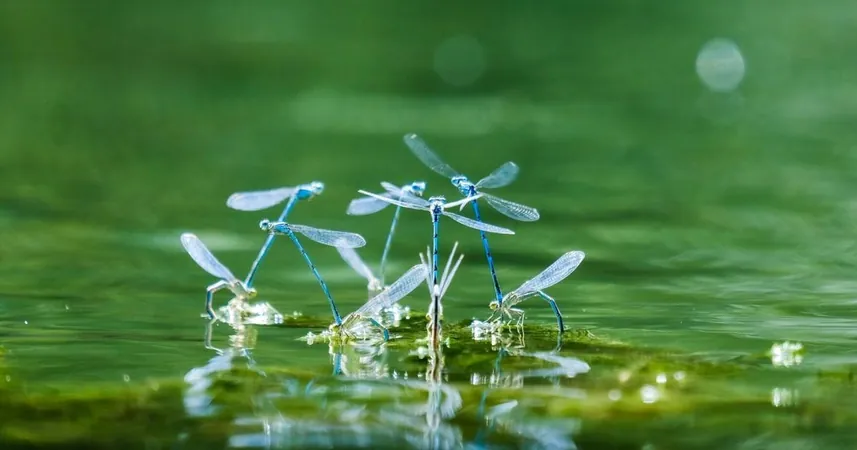
Dragonflies: Survivors of Asteroids Now at Risk from Climate Change!
2025-09-22
Author: John Tan
Experts Warn: Climate Change Threatens Dragonflies with Extinction!
In a startling revelation, researchers have found that dragonflies, the remarkable insects that have weathered the storm of asteroids, now face a new peril: climate change. A recent study led by scientists from the University of Colorado highlights that increasing temperatures and devastating wildfires could potentially drive these iconic creatures to extinction.
The Impact of Global Warming on Mating Patterns
According to the research, climate change disrupts critical dragonfly mating rituals, which could lead to local extinctions. The findings, published in the esteemed journal *Nature Climate Change*, indicate that dragonflies adorned with dark wing spots, which have been traditionally associated with attracting mates, are becoming increasingly susceptible in this warming landscape.
A Vital Role in Ecosystems — But Not for Much Longer?
Dragonflies play an essential role in our ecosystems, acting as major predators of mosquitoes and a food source for a variety of species, including birds, fish, and amphibians. The decline of these insects could have cascading effects throughout food webs, threatening ecological balance.
Adaptation Isn't Enough!
Lead author Sarah Nalley cautioned, "Although dragonflies have survived asteroids, they now face threats from climate change and wildfires that evolution may not be able to counter quickly enough." The study used 40 years of data, revealing that 'ornamented' dragonflies are disappearing from scorched habitats and overheating regions across the U.S., primarily due to the harmful effects of rising temperatures.
Excess Heat: A Reproductive Hazard
The research team employed thermal imaging to show that the dark melanin spots on their wings can absorb heat rapidly, causing male dragonflies to overheat. This overheating results in them spending more time seeking shade than competing for mates, ultimately impacting their reproductive success.
Beyond Survival: The Vital Importance of Reproduction
Unlike the case of peppered moths during the Industrial Revolution, where survival was tied to predator evasion, dragonflies' wing coloration significantly influences reproduction. If they can't attract mates, populations risk disappearing entirely.
A Personal Journey Toward Conservation
The study emerged from a unique assignment in Dr. Moore’s class and relied on public data, but for PhD student Nalley, it hit close to home. After losing her house in the devastating 2021 Marshall wildfire in Colorado, she realized her passion for wildlife conservation was stronger than ever. "I wanted to understand how animals not only survive but also continue to reproduce in the aftermath of such disasters," she shared.
Broader Implications for Biodiversity
The findings raise alarms for biodiversity. If resilient creatures like dragonflies, which have thrived for millions of years, are vulnerable to extinction, it signals deeper issues for many species across the globe. Dr. Moore emphasized the urgency of revising wildlife management strategies to focus not just on survival but also on reproductive behaviors — the cornerstone of long-term species preservation.


 Brasil (PT)
Brasil (PT)
 Canada (EN)
Canada (EN)
 Chile (ES)
Chile (ES)
 Česko (CS)
Česko (CS)
 대한민국 (KO)
대한민국 (KO)
 España (ES)
España (ES)
 France (FR)
France (FR)
 Hong Kong (EN)
Hong Kong (EN)
 Italia (IT)
Italia (IT)
 日本 (JA)
日本 (JA)
 Magyarország (HU)
Magyarország (HU)
 Norge (NO)
Norge (NO)
 Polska (PL)
Polska (PL)
 Schweiz (DE)
Schweiz (DE)
 Singapore (EN)
Singapore (EN)
 Sverige (SV)
Sverige (SV)
 Suomi (FI)
Suomi (FI)
 Türkiye (TR)
Türkiye (TR)
 الإمارات العربية المتحدة (AR)
الإمارات العربية المتحدة (AR)